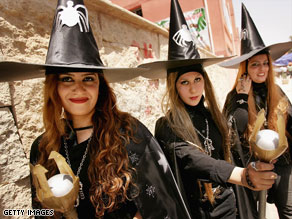
Children eat bread and porridge at a camp for displaced people 12 kilometers north of Goma in Congo.
A rebel spokesman said they were keeping to a cease-fire so aid can reach displaced Congolese.
Babou Amane, deputy spokesman for the National Congress for the Defense of the People, said rebel forces had retreated to about 9 miles (15 kilometers) north of the city of Goma to create a "humanitarian corridor."
Despite a rebel cease-fire declared late Wednesday, security in Congo's North Kivu province was tenuous, with many aid organizations refusing or reluctant to venture out to help the homeless, authorities said.
About 50 medical personnel from Medecins sans Frontieres can move throughout the area relatively unobstructed and supplies are getting in, said Marie-Noelle Rodrigue, the agency's local emergency coordinator.
"Security is a concern, of course," Rodrigue said from Goma, the provincial capital. "For the moment, we have not been stopped by anybody."
Thousands of displaced residents are on the move and Medecins sans Frontieres has mobile clinics dispensing water and any other needed aid, Rodrigue said late Friday.
"We're trying to move with the people," Rodrigue said. "We're setting up mobile clinics where ever they are."
There have been some isolated cases of cholera but no epidemics or other major health concerns, Rodrigue said.
"For the moment, it is still under control," the 40-year-old nurse said.
David Miliband, the foreign minister of Britain, and his French counterpart, Bernard Kouchner, were heading to Congo and neighboring Rwanda on Friday, their offices said. France holds the rotating presidency of the European Union, which is considering its options, officials have said.
In addition, U.N. Secretary-General Ban Ki-moon asked Alain Leroy, the undersecretary-general for peacekeeping operations, to travel to the region, the organization said.
European Union Commissioner Louis Michel was in Kinshasa, the Congolese capital, on Friday and obtained "verbal agreement" from Rwandan President Paul Kagame and Congo President Joseph Kabila to attend an emergency summit on the crisis to be held "in Nairobi [Kenya] under auspices of the United Nations," EU spokesman John Clancy said.
The U.N. High Commissioner for Refugees said it was investigating reports that some camps for displaced persons had been "forcibly emptied, looted and burned," according to a written statement.
In a written statement, the U.N. High Commissioner of Refugees spokesman Ron Redmond said Friday afternoon, "UNHCR staff in Goma this morning reported the situation calm but tense. Our office is open and our people are working, but security restrictions on movement remain tight."
He said rebels controlled Rutshuru, where UNHCR has an office. Rutshuru is 90 kilometers (56 miles) north of Goma, the provincial capital.
Redmond said the UNHCR was trying to verify "disturbing reports" from "humanitarian partners" about attacks on the camps near Rutshuru.
"We are extremely concerned about the fate of some 50,000 displaced people living in these camps, which include the UNHCR-administered sites of Dumez, Nyongera and Kasasa as well as several makeshift settlements," he said.
Rebel leader General Laurent Nkunda said Thursday that he ordered a cease-fire for his forces because he wants start work with the U.N. mission in Congo, known by its French acronym MONUC, to allow people back to their homes.
"We are respecting our cease-fire. ... We are waiting for the response [to the corridor offer] from the government and from MONUC, the U.N. forces," Nkunda said. "We want to have an agenda that we can discuss political issues with the government."
Nkunda, a Tutsi, has repeatedly blamed the Congolese government for failing to protect the Tutsi tribe from Rwandan Hutu militia in Congo. Hutu rebels have been active in the jungles of eastern Congo since Rwanda's 1994 genocide, according to the United Nations.
The United Nations estimates that during the 100 days of the genocide in Rwanda, the Hutu majority killed 800,000 Tutsis and and moderate Hutus.
The top U.S. diplomat for Africa said Friday that she was encouraged that the deadly conflict won't grow into "something that looks like genocide."
Assistant Secretary of State Jendayi Frazer spoke to CNN International by phone from Kigali, Rwanda, Congo's neighbor, where she planned to meet Saturday with Rwandan President Paul Kagame.
Frazer, who visited Thursday with Congo President Joseph Kabila, was making diplomatic rounds to deliver a U.S. message: "We understand the need for the Rwandans and the Congolese to work together to try to end the human crisis that's unfolded in North Kivu, as well as to cooperate together to address the negative forces in the eastern Congo."
One of the negative forces, she said, is the National Congress for the Defense of the People rebel force led by Nkunda, which fought government forces for four days until a cease-fire was declared late Wednesday.
Frazer said she would impress upon Kagame the need for continued cooperation between Rwanda and Kabila's government.
"Eastern Congo is very, very unstable right now. ... There have been attacks and counterattacks between rebels and the Congo military," she said.
Asked about the possible danger that the rebels could overrun Goma, Frazer said tensions seemed to be lessening.
"But I am growing confident that both President Kabila and President Kagame have been speaking to each other.
"They've exchanged envoys. ... They are engaged in the type of discussions that will be necessary to prevent such an attack on Goma as well as some type of ethnic reprisal that could lead to something that looks like genocide."
Frazer said the United States also recognizes the limitations of MONUC, whose soldiers have lent support to Congolese troops.
The United States has said for some time that they need more troops and specialized forces, even for a limited time while diplomatic measures are being pursued, she said.
On Thursday, MONUC spokesman Kevin Kennedy said U.N. troops, numbering a few hundred, were struggling to keep the peace in Goma, a city of about 1 million people, and the surrounding countryside.---------------------------------
1 million flee Congo fighting, U.N.

